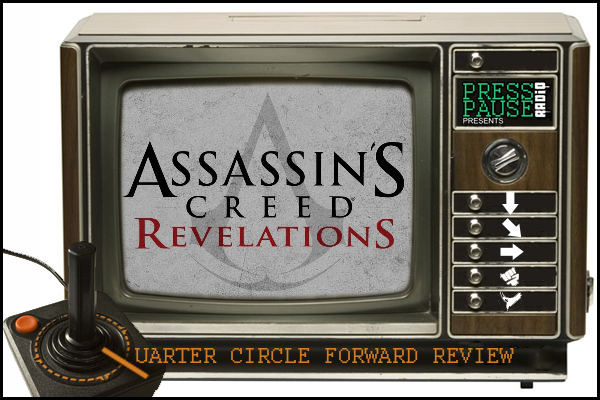QCF: Assassin's Creed: Revelations

Trapped... Desmond Miles is trapped within his own fractured psyche, his mind, desperately at ends with distinguishing what’s real and what’s fantasy. Desmond takes the only course of action he can. He sets out to finish the story of Ezio Auditore da Firenze, who also picks up the trail of his legendary forerunner, Altaïr Ibn-La'Ahad.
Enter the fourth entry in Ubisoft Montreal’s open-world action game, Assassin’s Creed: Revelations. The epic conclusion of Brotherhood left many with an insatiable appetite to continue the fight and return to Ezio’s story, but does Revelation satisfy the hunger we’ve had?

In a similar fashion to the previous titles, Revelations picks up right where Brotherhood left off, and the earth-shattering impact we felt with Ezio last year unfortunately doesn’t carry over with this newest installment.
Where to start? Let’s address the environment. The setting returns you to Masayaf, along with traveling to Constantinople in the same grand fashion of Rome. It’s here where the formula begins to show its age. The architecture, though faithful to the source material of its real-life equivalent to an extent, still has a familiarity of the typical physical layout and placement of buildings for climbing or vantage travel that adds to the sensation of going through a retread.
One new component that enlivens the stale recipe is the focus of Ezio’s Hook-blade, one of his new tools. In moments of giant leaps between in buildings in vantage travel, there was always a moment of uncertainty if your additional effort to reach a possible ledge without falling to your possible death to the street life below. With the hook-blade, however, this new dynamic allows you to be a bit more reckless with your extended reach, and makes travel feel more seamless. It compliments your climbing ability as well with faster climbing through leaps that can skip scaffoldings with the hook-blade’s reach and help you reach the top of any building and makes nearly all buildings climbable.
The last additions are conveniently placed zip lines located along connecting rooftops, which allow you to zoom across aerially within your sky-high hikes, and even present opportunities to perform flashy stealth kills. All of these new delicate techniques add to the travel throughout the city of Constantinople, and it has the same seamless charm and enjoyment when you trek through it that captured the same sensation from Arkham City, and something that hasn’t been accomplished before in the Assassin’s Creed series.
The hook-blade still plays a role of being the second hidden blade used within your standard combat, along with new parkour-esque attacks of being able to continually attack. Continued movement makes the evasion much easier to handle, but is troubled by its poor choice of command input, and the application behind it practicality feels unpolished to a point where I found myself using it less and less in evasion or combat.
Speaking of the combat, it's more or less untouched from what was seen in Brotherhood. Between the chain kills and rock-paper-scissors mechanic, the newest tweak to the formula comes to secondary weapon technique, which splits Ezio’s arsenal quite nicely. The pistol gauntlet, poison darts, throwing knives, and projectile are now split into a separate secondary weapon equipment slot, mapped to one of the face buttons which can be alternated simultaneously within melee combat, and without switching between equipment menus. In moments of being surrounded by enemy guards, the exchange of poison darts towards your brute opponents while dispersing sword swings against the remaining adversaries in your brawl does nothing to really reinvent the wheel. The fighting system remains nothing more than a pastiche, but a good one nonetheless. Another ingredient from Ubisoft Montreal’s attempt to shake up the gameplay is inclusion of bomb crafting.

You’re give given the ability to collect specific ingredients that make up components, which affect the kind of bombs you’re looking to craft for whatever tactics you’re looking for, whether it be destructive or decoy for stealth missions. The crafting has plenty of variety, but quickly loses its appeal since there is no way to advance bomb crafting, other than learning some tricky recipes with new materials collected as you advance. Bombs can be equipped as a secondary weapon, though the aim of the grenade arc is a bit off-putting. Environments you find yourself in are always busy, and several visual obstructions become an issue, altering the effectiveness of whatever tactic you had in mind. Bombs do, however, have the option of a quick-deploy in battle through a button-tap, but even this feels slow. As you pace your distance from your grenade, you take your opponent’s attention with you, and depending on the type of bomb, these efforts are also done in vain. There are destructive bomb types that can deploy shrapnel or caltrops upon explosion, which can counteract the said issue, but effort alone to such attention to detail feels really trite and ultimately out of place in what already felt like a complete fighting system.
The Borgia Tower mechanic returns, but is completely fleshed out in whole different manner. It's quite possibly the biggest change introduced through Revelations in two major ways. In similar fashion, when approaching a view point that turns out to be a Templar controlled den, you must find the Templar captain, eliminate him, and then capture the view point and territory’s influence, which is just business as usual. However, the first big change is that these dens are never permanently yours, and will be attacked by Templars, therefore determining how you reclaim it. What draws these attacks is the status of your current notoriety (the status bar that displays the level of awareness to Ezio’s movement and actions by the Templars). In previous entries, when notoriety was maxed, you originally ran for cover and hid, as Templars guards were constantly after you within any reasonable line of sight whether on the street or rooftop; this isn’t the case with Revelations.
Even with the most conscious efforts placed to monitor the level of your notoriety through herald bribes or murders of the proper officials, what was intended to make you more cognizant of your actions through gameplay simply feels tedious when you’re already tasking yourself with all of the available objectives, only to have it broken up by recapturing something you’ve already done. Being an open-world environment, even unintentional calls to attention from vantage travel build up your notoriety, so eventually these Den conflicts catch up with you, despite troubles to avoid it. And when they’re captured, in order to reclaim it, you’ll participate in the second big change: a pseudo-tower defense mini-game known as Den Defense.
In Den Defense, Ezio is an armchair general who's looking below from a rooftop at different angle. While some map layouts help the immersion, others are hindered by the perspective, and don’t feel practical for the intuitive layout navigation needed in tower defense. The interface is contextually flawed, as you’re never quite sure where to lay certain assassin troops. Wildly moving your cursor about, highlighted areas cannot be occupied by troops unless you plant an assassin leader for that quadrant, in which you can then deploy additional classes of troops.
These troops are long distance, and attack from the rooftops above while waves of enemy mobs attack your den from the streets. During waves, you have the ability to create barricades to hinder the progress of your enemy mobs along with others that can attack them with specific armament ranked by successive arsenal and defense. All these actions require a specific amount of morale, the currency for your actions in this mode to deploy troops or barricades which can be regenerated by kills and the number assassin leaders who still live in the occupied quadrants which will regenerate your morale. Really simple premise, but the execution is bad -- quite bad in fact. Until you win successive battles to gain ground troops, you’re simply regulated to long distance troops and some flying troops that don’t do much when enemy mobs come in large numbers. Other than firing your pistol gauntlet, there’s very little you can do.
The frenetic and otherwise chaotic nature of the player perspective, along with the spotty contextually and horrible interface, make every Den defense event feel like a chore. This will happen every time you have to reclaim a den, so what happens if you lose? You'll have to reclaim all over again, by finding the Templar captain and well... you know the rest.
The plot ties up loose ends left from Brotherhood, but as it develops, it’s made painfully obvious that the efforts made to have Ezio and Altaïr’s stories intersect feel arbitrary. The focus on subject 16, who up until now has just been this mysterious ethereal voice that communicated through recorded messages or environmental markings, permanently resides within the same Animus limbo imprisoning Desmond’s state of mind. Only relying on this alone gives you nothing really substantial to identify with this character, other than his appearance, again, feels trite, as if it was shoe-horned into an chapter that felt closed, but is only extended through some tedious addendum that does nothing more than provide filler for the Assassin’s Creed dedicated.

The multiplayer component, which was introduced in Brotherhood, returns with some takes on modes of King-of-the-hill or capture the flag. The inclusion of building an attachment of providing a substantial plot involvement helped sell the efforts of continuing the narrative from a different perspective, but being release within the same time frame of Battlefield 3, MW3, and Uncharted 3 doesn’t bode well on whether or not a community will invest in the effort.
Overall, Assassin’s Creed is in a strange position. While it’s not necessarily a bad game overall, by the standards set by its predecessors and is the worst game to introduce you to franchise with. Revelations hardly lives up to any of the expectations to advance the formula, and only attempts to do so through mostly artificial content that completely feels out of place in the game. I can only recommend this for any passionate fan who realizes that nothing is true, and everything is permitted…everyone else can skip it.
 Triple A Titles,
Triple A Titles,  assassin's creed | in
assassin's creed | in  QCF Reviews
QCF Reviews 










